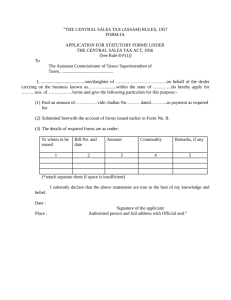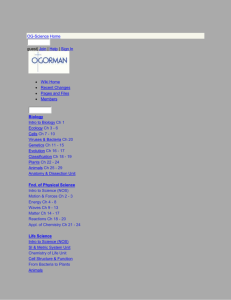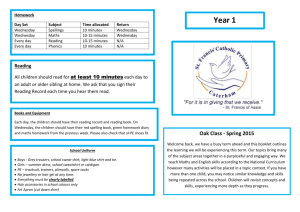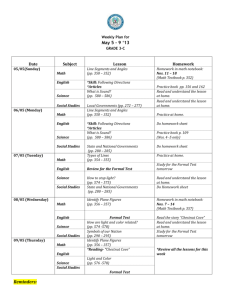carpenter
advertisement
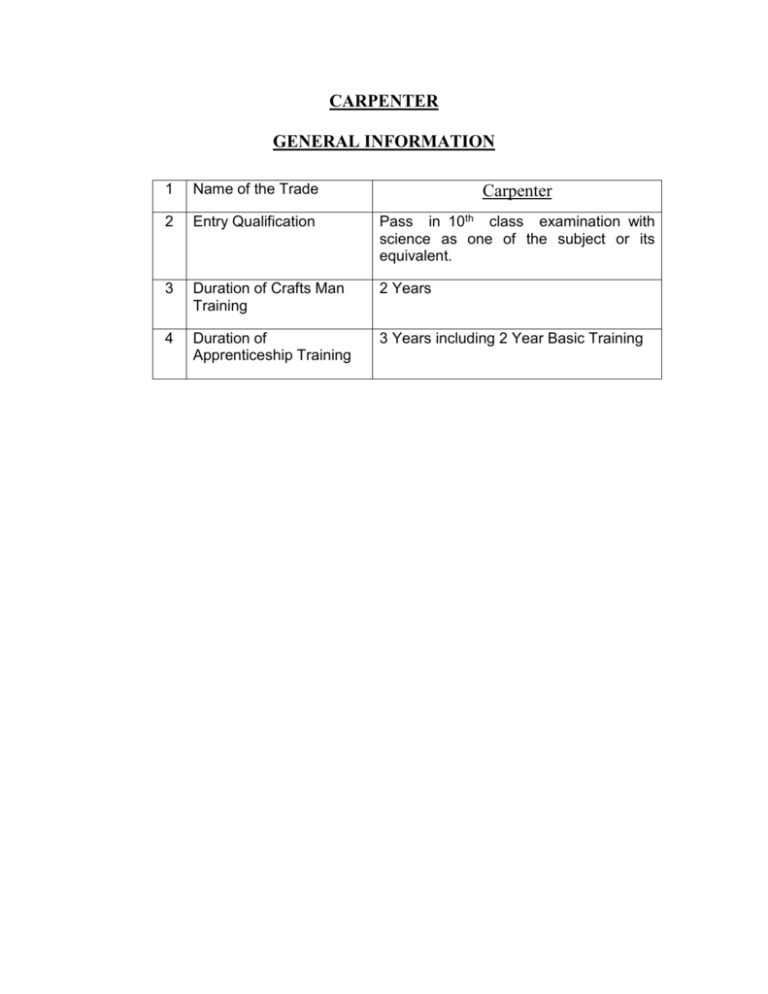
CARPENTER GENERAL INFORMATION 1 Name of the Trade Carpenter 2 Entry Qualification Pass in 10th class examination with science as one of the subject or its equivalent. 3 Duration of Crafts Man Training 2 Years 4 Duration of Apprenticeship Training 3 Years including 2 Year Basic Training DRAFT SYLLABUS FOR THE TRADE OF CARPENTER UNDER C.T.S. PERIOD OF TRAINING- TWO YEARS Week no. Trade Practical 1 NOTE: 1. 2 All the operations/ skills should be followed by proper demonstration familiarisation with the institute , wood working section and wood working machine shop. Demonstration on safety in shop floor and fire fighting equipment, showing of different exercises /jobs done by previous trainees, different Audio-visual aids, visit to library 2. Identification of common hand tools, demonstration on use of measuring, marking and testing tools. 3. Using of different types of saws used for Ripping, cross cutting Oblique sawing using saw horses bench hooks, bench vice ,bench stop, clamps etc. Assembling and adjusting a plane, planning a face & and edge. Squaring & end planning and checking their 4.&5. Trade Theory 3 Importance of the trade in the industrial development of the country subjects to be taught, general safety, causes of accident, fire etc. and their remedies. Duties, responsibilities of the trainees, discipline, different types of leave, recreational, medical facilities and other extra curricular activities of the institute. Introduction to carpentry hand tools – classification, nomenclatures and uses. Measuring, Marking and testing toolsdescriptions, Types size and use. Timber-introduction, types, Structure, sawing of logs, sawing of legs, seasoning of wood-introduction, objectives , Types Methods, materials used. Saws classification, descriptions, size and use . saw setting and sharpeningmethod and care Planes- classification, descriptions, size and use . Grinding & sharpening a plane W/shop cal. & Sci. 4 Engg. Drawing Fraction and decimal conversion and application related to the trade units meaning, importance fundamental and derived units CGS and SI system of units their conversion and application related to the trade Introduction to the engineering.Drg.,Basic concepts. Free hand sketching of lines & plain geometric figures. Free hand sketching of solids, cubes, pyramids. DO 5 ---DO--- DO ---DO--- DO ---DO--- accuracy in each stage. Sharpening a plane blade. 6. Marking and chiseling along the grain, across the grain, vertically, horizontally. Sharpening of chisels. 7. Trenching, Making Halving joints cross, ‘T’ ‘L’ corner, oblique Dovetailed half lap. 8& 9. Making Temon & Mortise joints through, stopped Barefaced, Haunches, Housed Mitered, Stub, Twin, Double Temon & Mortise. 10. 11& 12 Marking dovetail joint T through and stopped mitered Making dovetail joints & single, common through, Lapped, Secrets Mitered Using dovetails template. blade- Process and safety. Chisels- types, size and use. Grinding and sharpening of Chisels, Process and safety. Workshop appliances – workbench, bench vice, bench hook bench shop, mitre board –types, size and use. Striking toolsmallet, HammersIntroduction, classification and use. Introduction to wood working joints classification, description proportion & use. Growth & structure of timber trees, cross-section of an exogenous & endogenous tree trunk – its parts and their functions. Temon and Mortise joints- Classification, description, proportion &use. Identification of timber, conversion & Market forms of timber. description and uses of Bridle joints’ SeasoningIntroduction, objective & processes. Natural seasoning-(Water & Air). Proper stacking of timber. methods of finding out moisture content in timber Dovetail jointsclassification, descriptions, proportion & use. Artificial seasoning methods-steam-heated kiln, Furnace Kiln, Progressive kiln their description advantages & dis-advantages. Girdling methods of seasoning process & advantages Calculation of area of plain regular figures. Mass, weights, volume, Density & sp. gr. – explanation illustration, inter relation and calculation of various solids figures. Drawing of various lines. Lettering and numbering. DO ---do -- ---do--- ---do-- ----do--- - - Ratio & Proportion Revision & application in related shop problems. Displacement speed, Velocity, Accelerationdefinition, explanation, illustration, relation, calculation Conventional representation/symbols of various engineering materials. 13 Making broadening jointssimple butt, Rebated Butt, Pocket screws Butt etc. 14 Making housing jointsthrough stopped, barefaced & dovetailed. Making miscellaneous Framing joint –Land Butt, End lapped & mitered. 15 Making lengthening joints different types of scarf joints. 16 Practicing drilling and boring (by hand) of different sizes vertical and horizontal & countersinking and counter boring. Curve cutting, curve planning, molding and grooving. 17 21. to Wood working machine aquentance with machine parts their functions and performing different operations- safety. i) i) Band saw –removing, coiling and mounting blade . Ripping, cross cutting , curve cutting , saw setting and sharpening/ grinding practice. ii) ii) Circular sawRemoving and Broadening jointsdescription, proportions & use. Defects &diseases of timer-causes & remedies. Housing jointsdescription, proportion & use preservatives & preservation of timber. Description, proportioned & uses of different End butt joints . preparation & application of different types of glues-Animal, casein, contact synthetic resin etc. Types, proportion construction and uses of scarf joints. Properties of timber and qualities and of good timber. Tool bits-types, auger , hand drill, breast drill ratchet. Brace & hand Augertheir description sizes and uses. Description, types, sizes and uses of Bow saw coping saw, fret saw, Compass plane , molding planes, plough plane rasp Files and spoke shave. Wood working machines types, sizes , parts and their functions and operations and safety precautions and maintenance. Common hardware nails, wood screws, hinges , hasp and staples, tower bolts and other fittings – types, sizes and use. related to shop problems. ---do-- ---do--- ---do- ----do--- ---do-- ---do--- -- - Application of square, cube, square root & cube root in trade related problems. Newton’s laws of motionstatement, explanation, force, effects of force, units and types. ---do---- Free hand sketching of different carpentry hand tools. mounting of saw blade. Ripping, cross cutting, mitering, rebating grooving, beveling Tenonings etc. practice. iii) iv) iv) v) vi) vii) 22 23 to 25 iii) Practicing – surfacing , edging , chamfering beveling thickening etc. on planning machine . wood planning machine. Mortising machines. iv) Practicing plane , taper & form turning , using turning tools on wood turning lathe iv) Grinding of different types of toolschisels, plane blade etc. on pedestal grinding machine, sharpening of saws & cutter used in wood working machine v) Drilling by different bits & counter – inking on drilling m/o , practicing of , portable Elect. Drill vi) Mortising by combined Hollow chisel & chain mortiser, Grooving by chain mortiser vii) Tenoning by single Ended tenoner Visit to Establishment. Making door ---------do-------- Industrial frame & Door frame shutters – Single algebra formula e.g. (a+b)2, (a-b)2, a2-b2 etc. friction definition, illustration, types , effects, minimising frictional effect ----------do------ shutter with rebated butt joints, Hinging the shutter with the door frame, Making of a paneled door , hinging , fitting the door bolt & door lock in the frame 26 types , size , use and constructional details Windows-type , use & constructional methods. Sy6nthetic carpentry materials Compound fiber board Compound saw dust Board ----------do--------Compound saw dust & plaster of Paris --------do------ FactorizationSimple exercises related to the trade. Work,. Power, Energy H.P. , B.H.P. & 1 HPdefinition , explanation, illustration related calculation 27 & 28 Making small articles like a tea – tray , office , tray, box with sliding top hasp and staple cup board lock etc. Wooden floor , roof & partitionBrief description , related terms, sizes, joints used Description , size & uses of plywood & laminated insulation fiber/synthetic board, job dressing, putting , sand papering staining of filling . Preparation & application of wood finishing materialsfinishing materials – French polish, wax polish, paints, varnish, Lacquer & lacquering 29 & 38 Making simple wooden furniture like notice board , office rack , stool, bench , centre table, writing table with drawer & lock, meat safe, cup board etc. Job dressing sand papering ,staining, filling etc. for polishing , varnishing, & painting on finished articles 39 Repairing & reconditioning of hand tools, equipment Brief description, size, type & use of Miscellaneous hand tools- screw- driver, spanner, clamps, pincer crow bar with chisel & claw etc. 40 Identification of pattern making hand tools. Lay out of simple solid pattern on the lay out board and making pattern as per layout. Introduction to pattern makers hand tools. Patterns layout, types, solid ,split, multipiece, skeleton etc., pattern allowances shrinkage, --------do-------- ---------do------ Simple & simultaneous equations- Basic concepts & related problems Elasticity, stress & strain, Modulus of Elasticity – Basic concept, illustration, importance \& related calculation. Basic Geometry common geometric figures-Angle ,Triangle ,Polygons, circles – Definition, type, illustration & properties & shop calculation. Heat & TemperatureExplanation, relation, unit. Effect of Heat, Expansion of Isometric & oblique drg. Converting isometric to oblique. Dimensioning technique & application Orthographic Projection Basic concept, importance & application. -do- Draft, Machining & use. 41& 42 Lay out of split pattern, marking and making a split pattern making of wooden dowels for above patterns with self core & prints. Preparing core box and painting the pattern, core box etc. as per I.S. specification. solids, Co-eff. Of linear expansion. Pythagorous TheromApplication, CalorimetrvQuantity of heat/specific and Latent heat, Heat gain and Heat loss –Basic concept, inter relation and application Dowel type, size & use core & core prints, type & use colour code as per IS specifications. Use of paints on pattern core, core box, core prints etc. ALLIED TRAINING – SIMPLE Development of solids. FITTING 43. Familiarization with the fitting hand tools- hacksaw, punch, hammer , coldchisel,files, marking block, surface plate scriber, etc identification, use and care. 44 & 45. Chipping, filling, marking for making hanging plate, corner plate, angle plate, used for wooden furniture. 46. Familiarization with common hand tools-snips, sheet metal mallets, punch, hammer stacks etc. Development from drawing lay out of simple pattern. Common sheet metal toolsdescription , type, size & use. Reading of development drawing of simple job & system of lay out square, cylinder, cone etc. Cutting, folding, forming, bending & making simple items useful in carpentry trade, simple soldering, brazing and welding. Making & making template for carpentry work. Shearing, punching, folding, bending etc., sheet metal operation- process, use &care. Soldering, brazing and welding- basic principles, process, use & care. Menstruationarea peri-meter of triangle, rectangle, circle etc. volume & surface area of solid object related calculation ElectricityAC/DC, Basic concept, safety & application Uses of Fuses, Switches, conductors and Insulators and Safety involved. Repairing Common Indian timbers ----do-- 47 48. & 49&50 old furniture, General safety in fitting ---do-shop. Marking tools, steel -rule, try square, scriber, dividers, calipers etc, surface plate, Marking block etc, description, size, use and care. Vice clamps, hacksaw, ---punch, hammer, cold, do----chisel, files-types, sizes, use & care. Tap & die, drill bits -types, size, use & care. Corner plate, angle plates etc. used in carpentry trade- uses. Nut & bolt, washer machine screw etc. –type, size, is specification & use. ALLIED TRAINING - SIMPLE SHEET METAL WORK -3 ----do----- ----do--- ---do--- ---do--- door & window etc. 51&52 Week No. RE VISION Trade Practical AND description source & selection for different work. TEST Trade Theory - Workshop Cal. & Science Engineering Drawing Geometrical problems on Angles, Triangles, Circles related to the trade. Physical PropertiesTenacity, malleability, Ductility, Elasticity, Brittleness, Hardness, Toughness, Cohesiveness & adhesiveness Concept, Illustration and use. -----do--- Drawing of different Wooden Joints (Freehand sketching) Furniture & Cabinet Making 53 Practice with laminated sheets-blackboards, plywood Types of Timber used in different furniture making. 54 Veneering and its use in Furniture & Cabinet making. Glues and synthetic adhesive, Basic need for modern furniture design for office, school, showroom, dinning hall, bedrooms Library etc. 55 56. 57.-58 59.-60 Carving work in the Preparation of dowels (Wooden & metal) Making of different types of joints. Making & fitting of Cabinet Fitting of hinges. locks handles, fasteners. Making different types of furnituretools, chairs, table, Sofa, Almirah. 61. Manufacture of Cabinet, bookcase, and rack, Almirah. 62. Making of drawers, cupboard, and diff. Types of fittings. Preparation of surface with plan, scraper and sand paper. 63. ----do--- ---do--- ----do--- ---do---- -----do--- ----do---- ----do--- ----do---- - Combination of wood and metal in furniture making, special tubular. Hardware used as nails, screws, types sizes, uses Nuts, bolts, washers, locks hinges, Hisp & Stable, tower bolt door handle other fittings. Wood surface & finishing materials, sand papers, Staining,varnishing, polishing, material, methods & case etc. -----do--- Common sheet metal toolsdescription, shearing, surface grinder punching, folding, bending operations etc. ----do--- Drawing of different types of fittings used in making furniture. Use of Calculator. Physical properties & uses of Rubber. Plastic, Fiber Sunmica, glass -----do--- Freehand sketching of various furniture. - ----do---- ----do--- ----do--- 64. Varnishing, polishing including polymer group & Painting. Preparation of bill materials, estimating costing. of & ----do--- ----do---- BAMBOO & CANE CEAFT 65. to Splitting the bamboo into Cane & Bamboo66 strips in assorted width & Introduction Structure & thickness. Physical. Treating and dyeing of strips property. 67 to Weaving of Bamboo mats Factors to be considered 68. for pressing work. Pressing for designing of artistic and in dies and finishing fancy types of baskets, canning practice on slab & boxes, tray, lampshades back of Chairs. etc. 69 70. to 71 72. to 73 74. to Making the following fancy items out of Bamboo-trays, flowers, baskets, lampshades, Table lamp, Huts, Magazine rack. Weaving of basket & Stool/chair, sofas with center table out of cane and finishing. Practice on splitting of cane, into strips in assorted width & thickness. Weaving of basket & Stool/chair, sofas with center table out of cane and finishing. INTERIOR Different types of Cane & bamboo, there processing and splitting into strips. ----do--- TrigonometrySin, Cos, tan Formulae. Effect of force on materials and relate safety factors. ----do---- ----do---- ----- Drawing different Bamboo joints, Weaving Design. ----do--Detailed Assembly drawing of different types of furniture made of bamboo/cane. ---do--- ---do--- do---- Art/methods of making cane/bamboo tray, lampshades, table lamp etc. Solution problems heights distance. of on & Drawing of different cane joints, knee joints, fancy articles, Sofa, Center table, Chair, flower vase stand. Furniture types & layouts Importance of built-in, dual purpose & cantilever type. Suitability of furniture for drawing room/living room, children room, kitchen room, and utilisation of space & Aesthetic value. Color Scheme. Color theories –Hue, Value & chrome; worm & cool color, light & Heavy color. Color schemes & their application. Factors affecting color scheme. Lighting-Effects created and types suitable for various activities and different areas. Solution problems heights distance. of on & Practice on water painting. & oil painting ----do--- to design one drawing hall showing the Interior Decoration. Simple levers & machines Mech. Advantage, velocity ratio efficiencyExplanation & application. ---do--- Lay out drawing of Drawing room, office room, showroom alongwith furniture & fittings. DECORATION 75-77. Preparing of charts & Layout of Drawing Room, showroom, office room. Peproduction of idea on paper through drawings. 78-79. Preparation of models on the above. Practice on coloring/painting. 80. Practice on Illumination & lighting different areas. 81-82. Decoration of temporary showroom. Identification of various upholstery materials & draperies Influencing the choice of furniture Furnishing materials for upholstery, curtain-its suitability in - ---do-- Measuring and cutting the materials to size & stitching, Boutique printing. 83. Practice on care & cleaning of carpets & Draperies, treatment of stains. 84. Practice on treatment & preservation of flowers & plants. Fixing acoustic boards and testing its effectiveness Practice on acoustic treatment. Visits & Video show ... 85. 86 87. 88. & Holding of pipe, Pipe cutting width hacksaw internal & External threading of MS Tube/conduit pipe & Polyphone pipes with taps & dies. 89. 90 91. to 92 93 to Bending of M.S. Tube/conduit pip[e, pipes to different angles. Making different pipe joints-plain, Elbow, Tee etc. And testing the leak age. Making pipe joints, between GI & Polyphone pipes Setting with clamps and aligning of pipes-both GI & politeness. Plugging of pipes, contorting of flow of liquid by using valves. terms of room/space windows. Drapery fabridselection, color, design & weave & introduction to Boutique. Use of materials for making flooring, ceiling (false), wall paneling-with decorative lamination materials and its suitability. Flower-Arrangement-Basic principles, brief introduction of Ikebono. Acoustic treatment, sound proofing-the process of carrying out acoustic treatment. ---do--- ---do--- ---do--- ---do--- ---do--- ---do--- Pipes-Introduction, specification/size/I.S. Norms), Material. Holding devices for pipes, types precautions to be observed while holding and cutting pipes. Hacksaw blade for pipe cutting, Relation between number of teeth on the blade & thickness of the pipe. Pipe thread-forms, size, taps and dies for pipe threading description size, Method of use. Lubrication & safety. Pipe bending-Methods, Equipment required, safety. Pipe joints-types, Materials used, leakage-testing methods. Solution of Triangle. Effect of alloying elements in the properties of C.I. and Steel. Clamps used for pipe setting, type, size and special care for setting. Sagging of pipes Methods of avoid it. Valves, Plugstype, size, function and safety for fitting. Calculations of volume of Timber and charges, painting surface. Heat treatment of metals method & effects. ----do--- ----do-- Symbols of pipe fitting, valves, Drawing of different sections of pipes. ----do--- Drawing of different pipe fitting elbow T straight and reducing sockets short pieces etc. BASIC WELDING 94. Preparing edges for welding of various joints. Safety and health hazier in Electric & Gas welding and cutting. Glossary of terms related to welding & ---do-- Welding symbols. Welding joints. Cutting. 95 96. to Making single Vee, Butt joints & Lap joint on M.S. sheet (5 mm) by arc. Making fillet & Corner Welding joints on M.S. sheet 6 mm by Arc. Gas welding with external filler. Assembly of Gas welding & Cutting equipment. Care and maintenance. Types of Arc welding m/c. Working principle, care & maintenance. Selection of Electrodes (size) and current during welding. 97. Brazing & Soldering practice on G.I., Brass and aluminum by Gas. Welding, brazing & soldiering of Aluminum, Bras, bronze & Copper. 98. Making single Vee Butt joint and Lap joint on M.S. sheet (5 mm) by the gas. Making Fillet ‘Corner Welding joints on M.S sheet 6 mm by Gas . Making Fillet weld between sheet & Pipe by Gas. Welding of G.I Pipes by Arc Welding of G.I. Pipes by Gas Types of weld joints, importance of Arc length & Arc characteristic. 99. GLASS WORK Methods of joining and fitting tubes by welding & brazing. Application and advantages of welding pipes. Arc welding defects, their causes and remedy. ----do- ---do--- Reading & platting of simple graphs. Physical Properties and uses of brass, bronzes solder, bearing metal, timber. Plain Carbon & Alloy Steel. ----do---- ----do--- -- Blue Print Read. -----do--- Definition of logarithmCharacteristic & Mantissa. Use of: logarithmic table. use of Antilog table. ----do--- 100 To 101. Cutting, Shaping, grinding etching of glass. Different types of glass & mirrors. 102. Fitting of glass & Perspex sheet in Windows mirrors. Visit to Industry. Revision & Final Test. Cutting, shaping, Etching of glass. 103. 104. Determination of Logarithm & Anti logarithm of numbers Multiplication & Division involution using Log table. simplification using log Estimation of requirement of materials & calculation of wastage. ----do--- Blue Print Reading of Doors, Windows, Furniture & Cabinet. ---do--- LIST OF TOOLS & EQUIPMENT FOR BATCH OF 16 TRAINEES/ ONE UNIT CARPENTER TOOL KIT SI. NO. 1. 2. 3. 4. 5. 6. 7. 8. 9. 10. 11. 12. 13. 14. 15. 16. 17. 18. 19. 20. 21. 1. 2 3. 4 5. 6. DESCRIPTION Rule six fold- 1 meter (inch & mm) Try Square (Metal) – 200 mm Bevel Square wooden stock 225 mm blade Marking Knife 200 mm Marking gauge Mortise gauge Metal Jack Plane 350 mm X 50 mm cutter Metal Smoothing Plane – 225 mm X 50 mm cutter Hand saw- 450 mm Tenon saw = 300 mm Firmer Chisel 25mm, 15mm, 10mm, & 6mm Bevel edge chisel-25mm, 15mm, 10mm, & 6mm Mortise Chisel-10mm, 6mm Wooden Mallet Claw hammer 200mm Screw Driver (Cabinet maker) 300mm Wood Rasp (Half round) bastard 250mm File half round 2nd cut 250mm Pincer – 250mm Nail Punch General Outfit Measuring Tape 2 Meter Construction Scale 1 Meter rip Saw 600 mm Cross 0 cut saw 600 mm Key hole saw – 150 mm Compass saw-300 MM. QUANTITY 16 Nos. 16 Nos. 16 Nos. 16 Nos. 16 Nos. 16 Nos. 16 Nos. 16 Nos. 16 Nos. 16 Nos. 16 Nos. 16 Nos. 16 Nos. 16 Nos. 16 Nos. 16 Nos. 16 Nos. 16 Nos. 16 Nos. 16 Nos. 1 No. 4 Nos. 4 Nos. 4 Nos. 2 Nos. 4 Nos. 7. 8. 9. 10. 11. 12. 13. 14. 15. 16. 17. 18. 19. 20. 21. 22. 23. 24. 25. 26. 27. 28. 29. 30. 31. 32. 33. 34. 35. 36. 37. 38. 39. 40. 41. 42. 43. 44. 45. 46. 47. 48. 49. 50. 51. 52. 53. 54. 55. Trying Plane (Metal) 450 mm Rebate Plane 250 mm Plough Plane with set of 8 cutters up to 12 mm width Metal spoke shave-50 mm cutter Mouldmg Plane set Claw hammer 500 gm Ball panehammer 500 gm Cross Pane hammer 200 gm Straight pane hammer 200 gm Screw driver (London pattern) 250 mm & 450 mm Card file (Steel ) wire brush Hand drill 6mm capacity Ratchet Brace 250 mm sweep Hand auger-25,20,12,8, mm Center bit-12,8,6 mm Twist drill bit, 12,10,8,6 mm Rose countersink bit-12 mm Breast drill 6mm capacity Center Punch Plunger saw set/Pistol grip type Number Punch 12 mm ‘C’ clamp-250, 150, 100 mm ‘T’ bar cramp-1.75 meter 1.25 meter 0.6 meter Carpenter vice 250 mm jaws Expansion bit 25 to 75 mm Saw sharpening vice 250 mm jaws Spring caliper inside 150 mm Spring caliper outside 150 mm Wing compass 300 mm Trammel points Fret saw frame 150 mm Plane adjustable circular 250 mm Router Plane Snip straight 200 mm Round crow bar with chisel and claw end 1070 X 25 mm Glass cutter Goggles pair Surface plate 600 x 600 mm Carpenters work bench 2400 x 900 x 800 mm height Steel Lockers, 2 compartments with individual locking arrangement 1900 x 910 x 420 mm depth Steel Almirah with shelves 1900 x 910 x 420 mm depth Instructor Table (half Secretariat) Instructor Chair Instructor lecture high stool Stool Chalk board with easel Material rack Paring gouge 6, 10 & 15 mm Firmer gouge 6. 10, 15 mm 2 Nos. 4 Nos. 4 Nos. 4 Nos. 4 sets 4 Nos. 4 Nos. 4 Nos. 4 Nos. 4 nos. each 4 nos. 4 nos. 4 nos. 2 Nos. each 2 Nos. each 2 Nos. each 4 Nos. 2 Nos. 4 Nos. 2 Nos. 2 set 2 Nos. each 2 Nos. 2 Nos. 2 nos. 16 Nos. `2 Nos. 2 Nos. 4 Nos. 4Nos. 4 Nos. 2 pair. 2 Nos. 4 Nos. 4 Nos. 1 No. 2 Nos. 2 Nos. 2 Nos. 1 No. 2 Nos. 2 Nos. 2 Nos. 1 No. 2 Nos. 1 No. 1 N0. 1 No. 1 No. 4 Nos. each 4 Nos. each GENERAL INSTALLATION & ACCESSORIES SI. No. 1. 2. 3. 4. 5. 6. 7. 8. 9. 10. 11. 12. 13. 14. 15. 16. 17. 18. 19. 20. 21. 22. Note 1. 2. Description Combined surface & Thicknesser Rise & fall circular saw machine (300 mm dia blade) Wood Turning lathe 150 mm height of centers, 1.75 meter bed motorised complete with a set of 8 nos. turning tools Tenoning machine ( Single ended) Mortising machine (Combined hollow chisel & chain) Bench Grinder 200 mm wheel D.E. Pedestal Drill machine 12 mm capacity Drill chuck 12 mm capacity with key Portable electric Drill 6 mm capacity with key (wolf type) Portable disc sander 200 mm dia Electric Blower Electric Heater 1000/1500 w Moisture Meter Electrical Drying Oven (Small type) D.E. Spanner (Set of 14) Band Saw machine (Narrow type) Electric Brazer (For brazing Band saw blade Universal wood working machine Grease gun Fire Extinguisher fire BUCKET Adjustable Saw sharpener Quantity 1 No. 1 No. 2 Nos. 1 No. 1 No. 1 No. 1 No. 1 No. 2 Nos. 1 No. 1 No. 1 No. 1 No. 1 No. 1 set. 1 No. 1 No. 1 No. 1 No. 2 Nos. 4 Nos. 1 No. : No additional items are required to be provided to the 2nd unit. The trainees for the main trade will be sent to the different sections for allied trade training. No sparate tools and equipment will be required for allied trades. WELDING Trainees Kit : 1. 1. Gloves pair leather 2. Shield fitted with glass 3. Fitted with Goggles pair welders 4. Hammer chipping 0.25 kg (Scaling) 5. Wire brush 15 cm X 3.7 cm 6. Lighter SHOP OUTFIT 1. Gas Welding set with all accessories 2. Arc welding set PIPE FITTING Trainees Kit :1. Hacksaw frame 12’’ 2. Hacksaw blade ½’’ 3. Hacksaw blade 1’’ 4. File Flat Second cut 5. Chisel 12 mm x 150 mm 16 Nos. 16 Nos. 16 Nos. 16 Nos. 16 Nos. 2 Nos. 2 Nos. 16 Nos. 16 Nos. 16 Nos. 16 Nos. 16 Nos. 6. Hammer SHOP OUTFIT 1 No. 1. 2. 3. 4. 5. 6. 7. 8. 9. 4 Nos. 4 Nos. 4 sets 4 Nos. 1 set 8 Nos. 2 Nos. each 2 Nos. 2 Nos. Pipe wrench Chain pipe wrench Spanner (appropriate size) Hack saw Tap wrench (Adjustable & fixed) Die holder Taps & Dies as per requirement Pipe Vice 100 mm Swivel base vice 100mm BAMBOO & CANE CRAFT I. 2 3. 4. 5. 6. 7. 8. 9. The Whole Bamboo splitter Shaping chisels Hand vice Hand drill with bits Tennon Saw Hacksaw Frame with Blade Bill Hook Hand Slick Mallet GLASS WORK Trainees Kit 1. 2. 3. 4. 5. Glass cutting tool (Diamond cuter) Scriber Grinding Stone Claw hammer 150 mm, 100 gm Glass Cutting pliers 16 Nos. 16 Nos. 16 Nos. 16 Nos. 16 Nos. INTERIOR DECORATION 1. 2. 3. 4. 5. 6. Knife file 4’’ 16 Nos. Safe edge file 4’’ 16 Nos. Round file 16 Nos. Triangular file 4’’ 16 Nos. Knife 4’’ 16 Nos. Snip 8’’ 16 Nos. SYLLABUS FOR THE TRADE OF CARPENTER UNDER APPRENTICESHIP TRAINING SCHEME PERIOD OF TRAINING-3 YEARS BASIC TRAINING NOTE:- The content of the syllabus under Craftsmen Training Scheme to be followed in the first two year (Basic ‘Trg.) of Appr. Trg. Scheme. SHOP FLOOR TRAINING (3rd YEAR) A. A. PRACTICAL: List of operations/skills/jobs given below are not necessary to be performed in order in which they are listed. 1. 2. 3. 4. 5. 6. 7. 8. 9. 10. 11. 12. 13. 14. 15. Revision of basic skills/operations done in the first two years. Introduction to safety precautions in the shop floor. Using of special hand tools e.g. Bow saw, Fret saw, key hole saw, panel saw, copping saw, cutting gauge, parcel gauge, Trammel points, trying plane, compass/circular plane, Block plane, Fillster plane, router plane, Torching plane, Molding plane, Expansion bit, Bevel edge chisel etc. Grinding and sharpening of chisels and plane blades. Refitting, Hard saws- Tapping, Reshaping, Dressing, Setting and sharpening of saw blades. Proper stacking and preserving of different types of timber. Making of different Broadening, lengthening and framing joints including double tenon, twin tenon, Task tenon, clogged dovetail, splayed dovetail, Tongue & grooved joints. Marking and making tea tray, office tray using splayed dovetail joint, stool, book shelves, racks, tables with drawers, different cupboards, chairs, different types of tables e.g. center table , dinning table, dressing table etc. using of hardware, nailing ,screwing , fitting of locks, handles. tower bolts, flush bolts, castors, hasp and staples, door ring, hinges- butt hinge, continuos butt flap hinge, parliament hinge etc. Making door and an window frames with their different shutters, use of lockers. Layout and us e of joiners rod. Layout and making of partition-temporary, stud etc. Construction of timber floor, stair case. Layout and construction of different roofs with ceiling. Use of wood working machines and their accessories circular saw, band saw, planner and thickener , mortiser (both chain and hollowchisel) tenonar (single ended and double ended), fret saw spindle moldier universal wood working machine , grinding machine(D.E.pedestal),adjustable saw sharpener wood turning lathe, drill machine etc, 16. 17. 18. 19. 20. 21. Construction of shuttering i. e.form work. use of plywood, laminated board, fiber and insulation board synthetic board etc. job dressing- scraping, sand papering, nothing, staining, filling, for French polishing, wax polishing, varnishing, lacquer finishing, painting. Using of different portable power hand tools. Working to simple architectural drawing. Brazing of broken band saw blade. ALLIED TRADE TRAINING:(4 WEEKS EACH) BLACK SMITH WORK :-Each apprentice must learn to make some carpentry tools- chisel nail punch, bending angles, brackets, marking knife etc.and also learn the process of annealing , hardening and tempering of carpentry tools etc. Sheet metal work and fitting work – Revision of work as already done in the first year. B.Related instruction :( trade theory) The content of the syllabus for first year training should be repeated. In addition they should learnt following lesson/ topics:-1. 1. Trade theory 1 2. 3. 4. 5 6. 7. 8. 9. 10. 11. 12. 13. Wood work—classification Safety rules---Body care tools and machine care, shop courtesy. Firefighting – Methods of putting out the fire –Fire appliances. Common hand tools- classification description, types, sizes, and uses and their maintenance. Workshop appliances-work bench, bench stop, bench hook, miter board, meter box, shooting board, pin block, hold fast, bench vice etc. Growth & structure of timber trees- Cross section of an exogenous tree trunk- its parts & their functions, structure of hard & soft wood, comparison between heart wood & sapwood. Property of wood- physical properties, mechanical properties, chemicals composition of wood . Conversion of timber- indetification of maturity of tree, methods of filling tree, methods of converting logs into timber- parallel, quarter radial, tangential sawing, boxing. Market forms of timber- names & sizes of their cross section. Seasoning-natural seasoning & artificial seasoning. Air seasoning of saw timber- advantages, shed foundation method of timber stacking, seasoning time, advantages & disadvantages. Artificial seasoning of sawn timber-structure & internal arrangements of steam heated kiln furnace kiln direct heated & indirect heated, progressive kiln advantages & disadvantages of kiln seasoning, grinding. Defects of timber – During growth knots, grains during seasoning-checking, splitting, shapes, warping, defects caused by insects, disease of timber- wet & dry rots, druseiness, foxiness, detainees etc. in of decayed timber & its remedy qualities of good timber. 14. 15. 16. 17. 18. 19. 20. 21. 22. 23. 24. 25. 26. 27. ii) 1. 2. 3. 4. 5 6. 7. 8. Preservation of timber-surface treatment, dipping treatment, pressure treatment, osmoses, process, butchery process, chariness process. Preservatives-types characteristics. Joint in wood working- Broadening-simple butt, dowethed butt, pockets screw butt, secret screw butt, rebated butt, tongue & grooved, further tongue & grooved etc. Lengthening joint- simple scarf, splayed scarf, table scarf, hammer head key joints. Framing joints – Tenon & mortise housing joints, dovetail & miscellaneous framing joints – their types, proportion, use etc. in details. Common glues – animal, fish vegetable, contact, blood alumna synthetic resinglues – their characteristics, preparation, application etc. Wood working machine – circular saw, band saw, planning & thicknessing mortising combined hollow chisel & chain tenoning, spindle moulder, universal wood working, wood turning lathe, drill machine, bench grinder adjustable saw sharpener Fret saw etc. Part their functions, size, use, and safety precautions etc. method of brazing band saw blade. Timber floor, roof, door, window, stairs, partition, shuttering (form works) – their types, terms used-names of different parts sizes, joints used construction etc. Common hardware – Nails, screw, locks, handles, tower bolt, flush bolt, castors, hasp & stape, hinges, door rings, door bolts etc. their type, size & uses. Plywood laminated boards, Fiber, insulation boards, synthetic boards – preparation, size, application use etc. Job dressing – Sand paper – its grade, staining knotting, filling- materials & their application, principal, ingredients of French polish, wax polish, varnish, lacquer paints – their characteristics & application. Common Indian timbers- their description & uses. Introduction to work simplification job study, job analysis including planning of sequence of operation, method of working . Casting of articles – estimation of materials used in the job with labour charge and other charges (As machining power etc. If any). ii) WORKSHOP & SCIENCE & CALCULATION – 3rd YEAR Revision of previous years work Problems connected with estimation of time, materials, cost etc. for the products of the trade. Advanced problems on menstruation, work power and energy. Meaning of tenacity, elasticity malleability, plasticity, hardness, compressibility and ductility. Meaning of stress, strain moudles of elasticity, ultimate tensile strength, factor of a safety and different types of stress. Descriptive explanation of expansion of solids, liquid and gases due to the heat coefficient of expansion. Brief description on transference of heat coeducation, convention and radiation. Further problems as applicable to the trade. iii) 1. 2. 3 4. 5. 6. 7. 8. iii) ENGG. DRAWING-3RD YEAR Revision of the first two years syllabus Freehand isometric drawing of wood working machines Sectional views of internal parts of woodworking machines. Freehand sketches of common hand tools. Isometric views of various wood working joints-split and assembly. Freehand sketches of hand tools and equipment of concerned allied trades. Freehand sketches of nuts, bolts, screws, hinges, nails, tows bolts etc. hardware. Isometric views of wooden common furniture.

